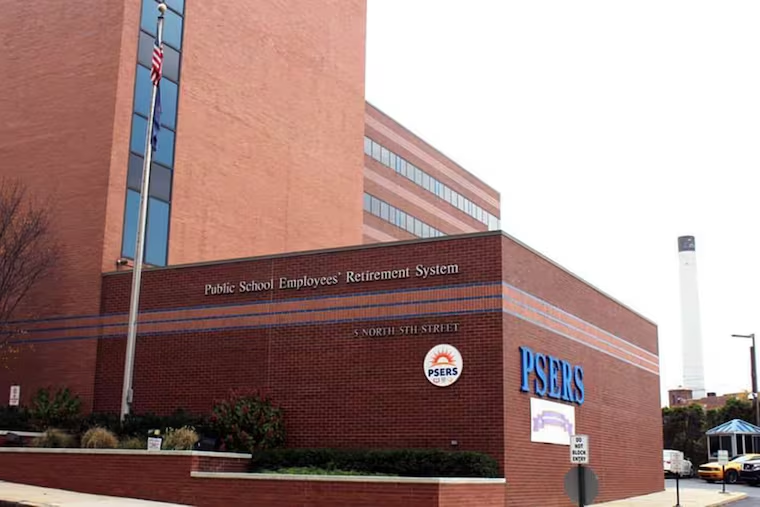PSERS veteran Spiller leaves as board shifts from hedge funds to U.S. stocks
A veteran PSERS executive who specialized in private investments is leaving as the big pension fund is switching to publicly-traded equities.

Charles J. Spiller, top officer for “nontraditional investments” at the Pennsylvania school pension system, is the latest leader of the troubled, $71 billion plan to step aside as trustees seek to reshape the investment portfolio he helped build so it looks more like other pension plans.
Spiller, 69, the second-highest-paid state employee in Pennsylvania, “is going to be retiring March 11,” Jason Davis, the Western Pennsylvania high school teacher who heads PSERS’s investment committee, told fellow trustees at a meeting Friday.
Spiller collected $400,000 a year, behind only his boss, James L. Grossman Jr., 54, who agreed in October to step down as chief investment officer effective last week. Their boss, executive director Glen Grell, plans to leave early next year. Grell and Grossman had been targeted for removal by board dissidents amid a pair of federal investigations into the education employees pension fund.
Trustees voted in August to dump the system’s hedge funds, a class Spiller and his boss Grossman had championed. But board members said the investments performed poorly. They said PSERS would have made billions more in profits if it had ignored the team’s exotic investment recommendations and invested more in U.S. stocks during the bull markets of the Obama, Trump, and Biden administrations.
In a statement, Spiller took credit for growing PSERS’s private assets from $1 billion in 1997 to $29 billion today during his tenure. He said he recently became a grandfather and looks forward to spending more time with his family.
Spiller, who attended Northeastern University from 1970 to 1975, already had years of experience in investment management before he joined PSERS — the Public School Employees’ Retirement System — in 1994 to buy and manage property directly for the fund.
A change in strategy soon put Spiller in charge of hiring professional investment managers to buy those assets for the system. He was named managing director for private equity and real estate in 1997.
In that post, Spiller led the staff that found and recommended hundreds of private equity, real estate, hedge fund, and other “alternative” investors in privately owned assets not traded on stock markets.
After Grossman took over as chief investment office in 2015, Spiller was named one of his deputies, still focusing on private investments, and given the added responsibility of building up a direct-investments portfolio, which now includes such properties as a Florida shopping mall, a California pistachio farm, and a string of Midwestern and Southern mobile-home parks.
Spiller recommended many investments to the board, including the purchase and demolition of three blocks of downtown Harrisburg, starting in 2017, for redevelopment that hasn’t happened. Those transactions are now a subject of separate investigations by a federal grand jury in Philadelphia and the U.S. Securities and Exchange Commission. No one has been accused of wrongdoing.
Spiller’s supporters, including his bosses, praised his broad knowledge of Wall Street opportunities and practices. After 2008, the system’s leaders, burned by stock market losses in the Great Recession and the earlier dot.com bust, accelerated the system’s pursuit of high-fee investments, in the areas where Spiller and his staff specialized.
But those investments failed to deliver extra cash as their boosters hoped. Instead, PSERS “missed the 10-year run-up in the bull market” for U.S. stocks, as state Treasurer Stacy Garrity told fellow trustees in Friday’s meeting, forcing school employees this year to pay more for their pensions.
PSERS officials did not respond to requests for comment on Spiller’s planned departure Friday. It came on the same day trustees voiced renewed support for a plan that would sell off $7 billion worth of hedge funds, one of Spiller’s focus areas, and replace those investments with U.S. stocks.
Trustee Eric DiTullio, representing Pennsylvania school board members, defended PSERS’s strategy of recent years. He said the thought of nearly doubling stock investments gave him “heartburn” in the face of high inflation and a threatened loss of U.S. financial dominance: “I see it as a huge risk.”
But board colleagues made clear it’s a new day at PSERS. The plan had become “an outlier,” compared to other state plans, said Chris Santa Maria, PSERS board chairman and a history and social studies teacher at Harriton High School on the Main Line.
Selling hedge funds and buying more stocks along with other, smaller changes “get us closer to where the rest of the pension world is,” the chairman added.
“This represents a prudent approach,” added Joe Torsella, Gov. Wolf’s representative on the board, after years “on the wrong path.”